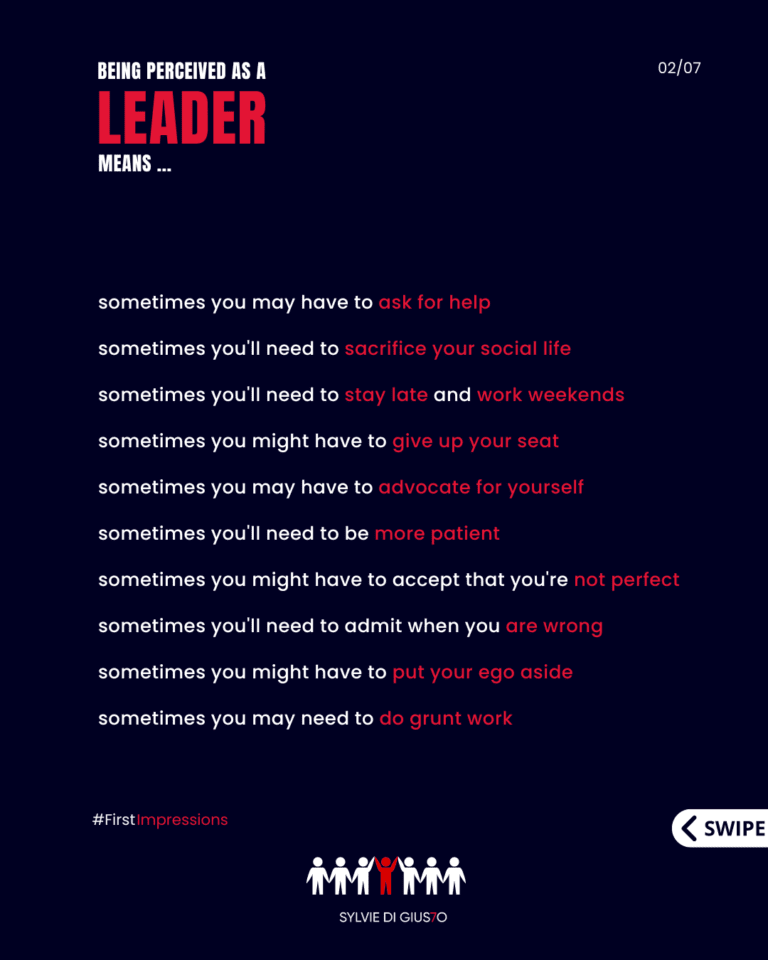Why the Right Attitude of a Leader Matters
While the term “leader” is often used interchangeably with “manager,” there is a distinct difference between the two. A leader is someone who motivates and inspires others to achieve a common goal. This can be done in a formal or informal setting, and a person doesn’t need to have a management position to be considered a leader. Quite possibly you are a leader too, even if you haven’t a formal title associated to it..
Leaders are often visionary and see the big picture, while managers are more focused on the day-to-day details. Leaders also have the ability to gain trust and respect, while managers may have authority but not necessarily respect. Ultimately, a leader is someone who others are willing to follow because they believe in the leader’s vision.
The Different Attitudes that Make Up a Good Leader
An effective leader needs to have the right attitude—an attitude of a leader. This means having a positive outlook on life and work, and being able to see the best in people and situations. A leader with the right attitude will be optimistic and resilient and will be able to motivate and inspire others. They will also be able to handle adversity constructively and will be seen as role models by those they lead. Their high level of emotional intelligence allows them to have the right attitude. Having the attitude of a leader is, therefore, essential for any leader who wants to be successful.
There are many different attributes that can make up a good leader. Some people are born with the natural ability to inspire and motivate others, while others have to learn and develop these skills over time. However, there are a few core attitudes that all good leaders share. First and foremost, good leaders are passionate about their chosen field or cause. They know what they want to achieve and why it’s important, and they use this passion to inspire others to follow them.
Good leaders are also confident in their abilities and decisions. They trust their gut instinct and are not afraid to take risks. This confidence is contagious and helps to build trust within the team or group. Finally, good leaders are always learning and growing. They realize that there is always room for improvement, and they are never afraid to ask for help or feedback. These different attitudes help to make up a good leader, someone who can inspire and motivate others to achieve great things.
How to Develop the Right Attitude of a Leader
There’s no magic bullet for developing the right attitude as a leader. However, there are certain things you can do to improve your chances of success. First, it’s important to be aware of your own biases and values. leaders who are self-aware are able to more effectively manage their emotions and reactions to stressors. Second, it’s important to be able to see things from other people’s perspectives. This ability to empathize with others will help you build trust and credibility as a leader. Finally, it’s important to be resilient in the face of adversity. Leaders who are able to bounce back from setbacks are more likely to be successful in the long run. By keeping these things in mind, you can develop the right attitude necessary for success as a leader.
Examples of leaders with the right attitude
Good leaders come in all shapes and sizes. But one quality that all great leaders share is a positive attitude. A positive attitude enables a leader to see the glass half full rather than half empty. It allows them to remain optimistic in the face of adversity and inspires those around them to do the same. Great leaders with positive attitudes also understand that failure is part of the journey to success. They view setbacks as learning opportunities and use them to become even stronger leaders. Attitude is everything, and these examples of leaders with the right attitude show us why.
What it means to have an attitude of a leader
With great power comes great responsibility. That may be a line in a superhero movie, but it rings true in many aspects of life. It is especially the case if you are a leader in the business world. In addition to working hard and making important decisions, they also must think of how they are perceived by others. Being in the spotlight, they are open for judgment and must make smart moves to maintain the right reputation.
Taking Risks
Leaders are often asked to make difficult decisions. The decision you make may not be popular with everyone. It may involve taking risks that might not pay off. But it’s important that you put yourself out there. Failure is possible, but you must learn from your actions and continue to move forward.
Confronting Others
As a leader, you will oversee a team. Your team may not always act appropriately. They may make errors due to carelessness or oversights. In these instances, confrontation is a necessary evil. It may be unpleasant, but in many cases, it will be the only way for a person to learn from their mistakes. You may be thought of as ‘the bad guy or girl,’ but if you approach conversations appropriately, you will gain respect and make your team more successful.
Develop Your Ego
Humility is important, but as a leader, you must be a bit egotistical. You need to be your own champion. You need to brag about yourself occasionally so others will think more of you. Investing in yourself will also be helpful in developing your ego. This may include taking classes, buying a professional wardrobe, and so on.
Own Up for Mistakes You Didn’t Make
Leaders are responsible for their teams. If someone in your team makes a mistake, it’s ultimately your responsibility. When something happens, trying to say ‘so and so did it’ will make you look unprofessional. You must own up for your team’s errors, no matter how much it hurts your pride. Later, you can talk to the responsible party about their error to avoid similar actions in the future.
Make Sacrifices
Being a leader is not always glamorous. You may have to stay late at the office and work weekends. You may sacrifice your social life and family life. Hopefully, it will all pay off in the end, but that’s a risk you’ll have to take.
Put Your Ego Aside
No matter how much you build up your ego, there are times when you will have to put it aside. You may have to ask for help, admit you are wrong, do grunt work, give up your seat, or accept that you’re not perfect. This is all part of working with others and being adaptable in the workplace.
Develop Patience
Leaders are often short on time. But you must understand that not everything happens overnight. Sometimes you will have to wait for results. You will also have to be patient with others who may take time to learn or may not be able to deliver right away because they are dealing with other priorities.
Deal with Feedback
Feedback is an important part of skill development. You will receive feedback from others, and you will deliver feedback to others. Feedback isn’t always easy to take, but you will need to learn how to give it and receive it if you want to be successful.
Become a Role Model
When you are a leader, it’s all eyes on you. You will be a role model to many. That means you will constantly need to be aware of the image you are sending through your appearance, behavior, communication, digital assets, and environment.
Develop Your Listening Skills
Listening is part of communication. As a leader, you will learn how to develop listening skills, so you get the full message people are sending. This involves more than listening to their words. It also requires asking questions and paying attention to body language.
Learn to Let Go
Leaders need to pick their battles. If you argue about everything that rubs you the wrong way, you’ll find you spend more time arguing than getting things done. Focus on what’s truly important and let the little things go.
Learn to Disagree with People
When it comes to business, not everyone will be on the same page. If someone has an opinion you don’t believe in, you may have to disagree with them. Sometimes, you may even end up disagreeing with someone more powerful than yourself. Beyond being a difficult situation, this can also have professional repercussions. But at the end of the day, it’s important to be true to yourself and defend your beliefs. This will earn you respect in your field.
Put the Needs of Others Before Your Own
Being a leader means sometimes you will need to put others before yourself. You must consider the pressing needs of your colleagues and team members. And in today’s social climate, it’s important to give back to your community and charitable organizations.
Learn to Delegate
Many leaders have trouble delegating. But if you don’t delegate, you will end up taking on more than you can handle, and important tasks may get shoved under the table. Sometimes, you may even have to delegate more than you would like to. But if you have a strong team, it will work out in your favor.
Remain Calm Under Pressure
Staying calm under pressure is not always easy. But a leader must set an example. If you lose your cool, it will look bad for you. Worse yet, the people on your team may follow suit and begin getting anxious as well. Breathing techniques and other strategies will help you maintain an even demeanor.
Find Common Ground
You may not always agree with the people you work with. If this is the case, you will need to find a common ground. Compromising isn’t always easy, but in some instances, it needs to be done.
Take on More Responsibility
The more your company grows, the more responsibility you will have. It’s hopeful that you will be able to delegate some of this responsibility to others, but that isn’t always the case. That’s why many leaders end up working evenings and weekends.
Give Credit, Even Where Credit is Not Due
Leaders will need to give credit to their senior executives and their team. Sometimes, not everyone will have done their part, but it’s important to be gracious to everyone involved. Not doing so will seem petty.
Improve Your Problem-Solving Skills
Problem-solving is not easy. But it is one of the tasks of leaders must deal with, sometimes daily. You must develop skills such as decisiveness and out-of-the-box thinking to come up with the best solutions.
Give Pep Talks
There may be times when you or someone on your team is dealing with a lack of motivation or confidence. If this is the case, you must be there to provide a pep talk. The pep talk may be given to your colleague or a team member, or you may even have to give yourself a pep talk.
Stand Up for What You Believe In
When it comes to business, compromises must be made. But it’s important to stand up for what you believe in. This will establish you as someone of respect, and it will bring you closer to achieving your goals. Standing up for yourself will require being brave and taking the lead when no one else will. It may be challenging, but these are skills a leader will have to develop.
Learn New Things
Innovation is the key to success. Leaders must constantly innovate and learn about new trends and strategies. Learning can be a humbling experience, but it’s a necessity in the business world.
Put Yourself First
When it comes to caring for your interests, sometimes you will need to put yourself first. This is necessary for putting your ideas out there and making sure they are listened to. However, if you put yourself first too often, you may get a reputation for being difficult to work with. Balance this behavior by putting others first when it’s appropriate.
Being a leader is not always easy. Sometimes you may find yourself in uncomfortable situations. You will deal with conflicting personalities, and you won’t please everyone all the time. But it comes with the territory.
Attitude of a Leader in a Nutshell








PS: Interested in more content like this? Make sure to follow me on Instagram. It’s where I visualize and publish my thoughts daily. I hope to see you there.




